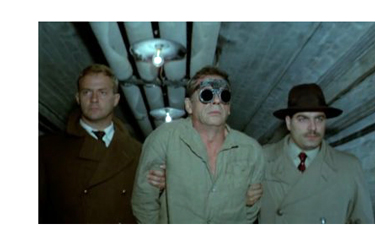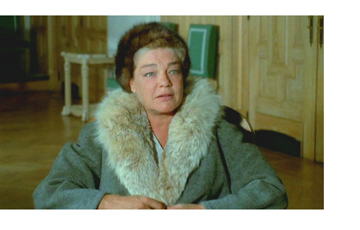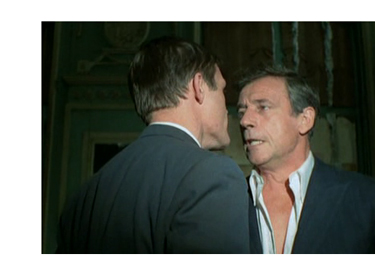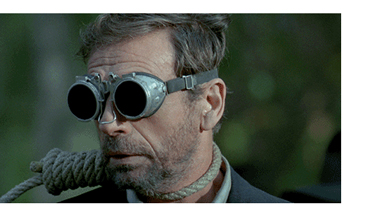
 |
|
|
|
Politically committed director Costa-Gavras is featured in two Criterion releases this month, thrillers that came immediately after his smash 1969 international success "Z". The director followed the lead of Gillo Pontecorvo in placing his advocacy films in the mainstream of popular filmmaking, reaching bigger audiences than would strict documentaries like The Battle of Chile or Far from Vietnam. Today's 'hip' genre-oriented reviewers seem to have lost the appreciation of these bold, important pictures; I not long ago read a disparaging review of "Z" that appraised it a suspense thriller and nothing else. Back in 1969 "Z" awakened a lot of people to some harsh political realities... its excellence as a 'thriller' is of almost secondary importance. 
Costa-Gavras' next two films are about political prisoners, and both star Yves Montand. The first, 1970's The Confession is surprising in that it is highly critical of Eastern European communism. The subject is a 1952 political purge in communist Czechoslovakia, taken from the biographical novel by a husband and wife, both model communists with impeccable backgrounds. Czech party official Artur London (Yves Montand) becomes aware of a new 'investigatory committee' unknown to official channels. A lifelong anti-Fascist, Artur and his closest friends realize that party members that are Jews or veterans of the Spanish Civil War are the ones being arrested. When Artur makes a proper protest he's arrested, as are some of the higher ups that told him everything would be okay. Artur's wife Lise (Simone Signoret) is told that he's being 'detained for protection', when he's really beginning a years-long imprisonment that involves physical and psychological torture. Artur is not told why he's being detained. By the time the personality-eroding methods of his inquisitor Kohoutek (Gabriele Ferzetti) take hold, he no longer cares. The secret committee is purging an entire party echelon to stage a show trial on trumped up charges, all of them lies. At the elaborate trial, London and his associates are coerced into broadcasting their false confessions over the radio. The Confession is a full exposé of the methods of an oppressive state, which of course can happen in any power structure where political opportunists can imprison people without charges, and induce them to give false testimony or confessions. This particular outrage happened in the early '50s, presumably because the Czech communist party felt the need to prove to Moscow that they were tough on traitors. Under Stalin's influence, this sort of oppression had been an ongoing process since the middle 1930s. Mao did it on a vast scale as well. But the basic mechanism is really no different than what happens when any corrupt lawman tricks or beats a confession out of a suspect. 
The unrelenting Confession encourages us to share Artur London's ordeal on a personal level. He's beaten at times, and forced to walk in his cell for hours on end. He's starved and shouted at and otherwise brutalized, all to soften him up. It takes months before he stops demanding to see a party representative. London's generation of commies had accomplished some serious fighting against Franco and Hitler while allied with the French and Americans; perversely the fact that they cooperated with those allies now makes their loyalty easy to malign. Various inquisitors try to break down London, and the one who succeeds (Gabriele Ferzetti) does so by getting him into the habit of signing statements put before him. First Artur is made to admit to simple things, such as simply knowing an American agent during the war. Once he signs a statement to one fact, he's pressured into signing other half-truthful statements. This edges him toward falsely confessing to crimes of disloyalty: "Stop being subjective and sign it." "It's just a formality." "We'll change it later." "So-and-so signed this, you have to too." All but robbed of the ability to form a coherent thought, London is eventually signing every lie placed before him. Before the trial date he's fattened up and given good clothes. At the last minute the accused are warned that there will be drastic consequences if they retract anything while confessing on-microphone. The state ends up with a docile, obedient bunch of defendants for their show trial, which is heard by the entire nation. Lise has meanwhile been evicted from her good government housing and must take a factory job. She's been with Artur since Madrid and Paris, and when she hears her husband confess on the radio she's destroyed. Unable to question the state, she makes a voluntary public statement denouncing her husband. Is that what saves him from being executed along with the majority of his unjustly accused comrades? 
The awful power of the state, when organized to such evil, is nigh unopposable. London's tormentors are Orwellian thought-policemen, trained for and dedicated to their difficult work. If they fail, it's their necks too. The process is a 'good cop, worse cop, worst cop' routine. Most chilling is what happens ten years later when London is released from prison -- and his former inquisitor meets him on the street: Franz Kafka must have known days like that. What most impresses us is that the real Artur and Lise remain dedicated communists, and believe in the idealistic notion that governments with such concentrated power need not become oppressive. The Confession would appear to argue the opposite. At the same time in America, we had our own 'show trials' for the exact same reason, the organized oppression of citizens suspected of association with the enemy, with no trial, no evidence, no opportunity to defend one's self. There's no comparison in terms of severity, but the principles were identical. The Confession is visually stark but not itself an oppressive experience. Raoul Coutard's cinematography serves as a cool witness to events. What we most remember is Yves Montand, looking haggard and drawn, being led around wearing a noose on his neck and heavy welder's glasses to keep him blinded. As pointed out in some of the disc's extras, London is similarly costumed to the time traveler in Chris Marker's science fiction film La Jetée. He's suspended in time and space in an existential limbo, and bombarded by absurd, evil demands to conform and obey. Montand played another veteran anti-Franco communist in Alain Resnais' La guerre est finie, a film that seems a sort of 'background' to this one. 
Ms. Signoret carries out her role well, and Gabriele Ferzetti adds another impressive performance to his resume -- his inquisitor takes his job casually, as if being on the comfortable end of the torture game was a birthright. He never breaks a sweat over what happens to other people. I've known a couple of corporate executive-bosses like that, utterly charming people. 1 The Criterion Collection's Blu-ray of The Confession is a richly textured presentation of a movie that plays out largely in ugly, windowless rooms. The transfer has no issues and the source materials appear to be in pristine condition. The French dialogue is well recorded. Criterion's producer Elisabeth Pauker locates excellent vintage extras and creates some new ones. You Speak of Prague: The Second Trial of Artur London is a BTS documentary by none other than Chris Marker, the film's still photographer. It features material with the director, author, screenwriter and stars. We learn that Montand lost quite a bit of weight for the role, trying to achieve a starved appearance. Artur and Lise London discuss their experiences as political prisoners in Portrait London, a 1981 French TV program. A solo interview with Yves Montand comes from 1970, and a new interview is present with editor Françoise Bonnot. Costa-Gavras and scholar Peter von Bagh talk together for a full hour in a piece recorded in 1998, and a final interview is with John Michalczyk, author of a book on Costa-Gavras. The insert foldout carries a text essay by film scholar Dina Iordanova, who previously contributed memorable writings for Criterion's Ivan's Childhood, Letter Never Sent and 3 Films By Roberto Rossellini starring Ingrid Bergman discs. 
On a scale of Excellent, Good, Fair, and Poor, Footnote:
1. A tiny casting note. The genre fans that diss committed political films may be surprised with a sensation of déjà vu when the face of actor Umberto Raho pops up. He's in a number of cult horror and fantasy pics from the previous decade, including The Ghost, Castle of Blood, The Last Man on Earth, The Long Hair of Death, The Wild, Wild Planet and The Bird with the Crystal Plumage.

The version of this review on the Savant main site has additional images, footnotes and credits information, and may be updated and annotated with reader input and graphics.
Review Staff | About DVD Talk | Newsletter Subscribe | Join DVD Talk Forum |
| ||||||||||||||||||